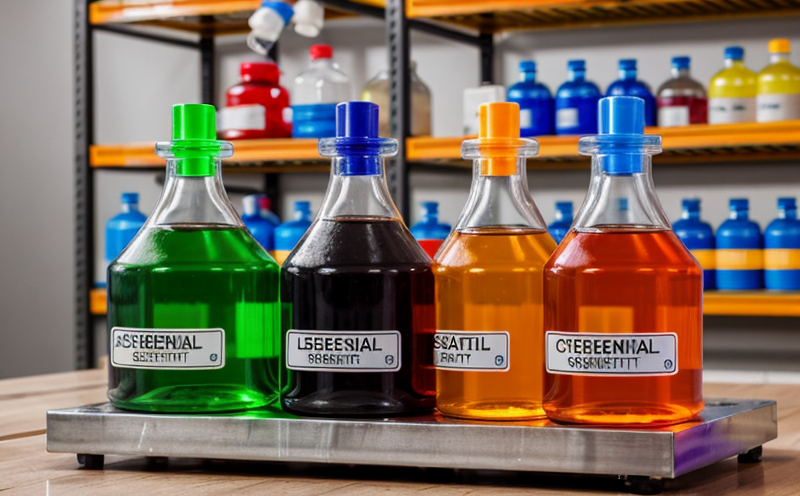Hydrocarbon Solvent Testing in Consumer Products
In today’s fast-paced consumer goods market, ensuring product safety is paramount. Hydrocarbon solvent testing plays a critical role in identifying and mitigating risks associated with the use of volatile organic compounds (VOCs) in consumer products such as paints, coatings, adhesives, cleaning agents, and personal care items.
Hydrocarbons are a group of chemical compounds consisting entirely of hydrogen and carbon. These solvents are widely used due to their excellent dissolving properties. However, many hydrocarbon solvents possess hazardous characteristics that can pose significant health risks if not properly controlled during manufacturing processes or when in use by consumers.
For instance, exposure to certain hydrocarbons may lead to irritation of the respiratory tract, skin sensitization, and even carcinogenic effects depending on the compound. Therefore, rigorous testing is essential before any product hits the market. This includes assessing the content levels of regulated substances, ensuring compliance with relevant standards, and verifying that no harmful concentrations are present.
The testing process typically involves collecting samples from various stages of production or directly from finished goods. These samples undergo analysis using advanced analytical techniques like gas chromatography (GC), high-performance liquid chromatography (HPLC), mass spectrometry (MS), among others, to accurately quantify the presence and concentration of hydrocarbon solvents.
Compliance with international standards is crucial for manufacturers seeking to avoid legal penalties and maintain consumer trust. Relevant guidelines include but are not limited to ISO 17025, ASTM E836, and EN 14961. By adhering strictly to these specifications, laboratories ensure accuracy in measurements and reliability of results.
Once testing is complete, detailed reports outlining findings are provided back to clients. This information helps them make informed decisions regarding product development or necessary adjustments needed before launch. It also serves as an important tool for regulatory bodies overseeing market safety.
In conclusion, hydrocarbon solvent testing in consumer products ensures that manufacturers produce safe and compliant goods while protecting end-users from potential health hazards associated with improper use of these substances.
Why It Matters
The importance of conducting thorough hydrocarbon solvent testing cannot be overstated. Not only does it safeguard public health, but it also protects businesses against legal liabilities and reputational damage. Consumer trust is built on reliability and safety; any breach in these areas could result in severe consequences for companies.
From a regulatory perspective, adhering to strict standards helps ensure that products meet the required quality benchmarks set forth by governing authorities worldwide. Non-compliance can lead to product recalls, fines, or even bans from sale entirely. Thus, proactive measures taken during early stages of production are vital in preventing such outcomes.
On a broader scale, responsible use and management of hydrocarbon solvents contribute positively towards environmental sustainability efforts. By identifying and reducing the amount of hazardous materials used within manufacturing processes, companies play their part in minimizing waste generation and promoting eco-friendly practices.
To summarize, performing reliable hydrocarbon solvent testing not only upholds ethical business principles but also contributes significantly to overall societal well-being by fostering safer environments both at workplace and home.
Benefits
The advantages of undergoing hydrocarbon solvent testing extend beyond mere compliance requirements; they offer numerous strategic benefits that can enhance a company's competitiveness in the marketplace. Firstly, it provides peace of mind knowing that your products are free from harmful chemicals, thereby reducing risk to both employees and consumers.
Secondly, by ensuring strict adherence to industry standards, you demonstrate your commitment to quality assurance which builds brand reputation and enhances customer confidence. This can translate into increased sales and loyalty among satisfied customers who trust the safety of your offerings.
Thirdly, early detection of potential issues allows for timely corrective actions within production cycles reducing costs associated with post-market recalls or legal disputes. It also enables continuous improvement in product formulations leading to enhanced performance characteristics over time.
Lastly, participating in such testing positions you ahead of competitors by staying current on evolving regulations and best practices across the sector. This forward-thinking approach can set your organization apart as a leader in innovation and sustainability within your industry.
Why Choose This Test
There are several compelling reasons why choosing hydrocarbon solvent testing is advantageous for any business involved with consumer products:
- Regulatory Compliance: Ensuring that all products meet the necessary safety and quality standards set by governing bodies.
- Risk Mitigation: Identifying potential hazards early on in the production cycle to prevent costly mistakes down the line.
- Customer Satisfaction: Providing consumers with confidence that their purchased items are safe and reliable.
- Innovation Opportunities: Offering insights into improving product formulations for better performance while maintaining safety standards.
By investing in hydrocarbon solvent testing, companies not only protect themselves against risks but also contribute to a safer world where everyone can enjoy peace of mind knowing that the products they use are responsibly made and free from harmful substances.





